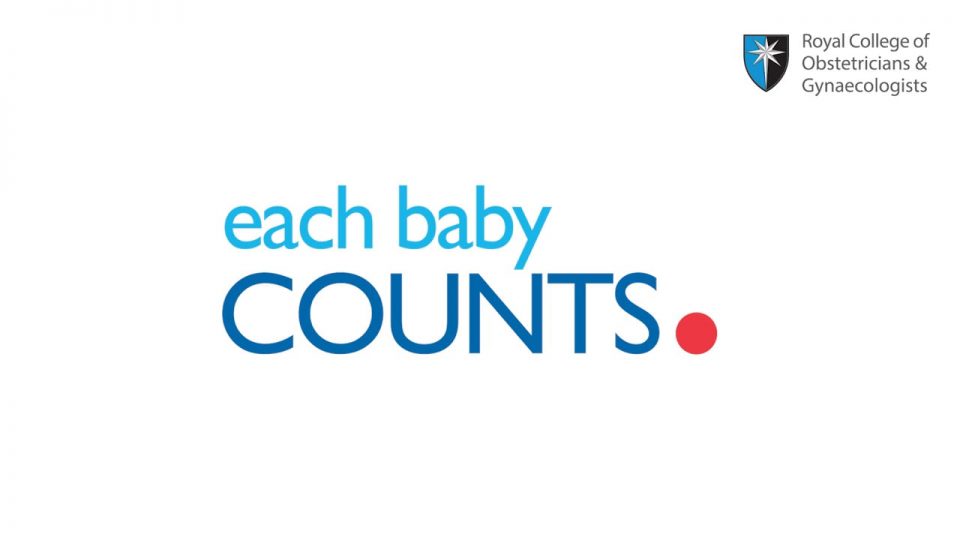Each Baby Counts is the Royal College of Obstetricians and Gynaecologists (RCOG’s) national quality improvement programme, launched in October 2014, aiming to halve the number of babies who die or are left severely disabled as a result of preventable incidents occurring during term labour by 2020.
A detailed analysis of all stillbirths, neonatal deaths and brain injuries that occurred during childbirth in 2015 has identified key clinical actions needed to improve the quality of care and prevent future cases.(i)
The Each Baby Counts team has now conducted 2,500 expert assessments of the local reviews into the care of 1,136 babies born in the UK in 2015 – 126 who were stillborn, 156 who died within the first seven days after birth and 854 babies who met the eligibility criteria for severe brain injury.
Results showed that quarter of the local investigations assessed were not thorough enough to allow full assessment of the care provided and the RCOG is calling for the quality of these investigations to be improved. The report also showed that key markers of a quality investigation were found to be variable across the UK with parents being invited to be involved in only 34% of reviews, external panel members involved in only 9% of reviews and neonatologists being involved in the review of only 68% of liveborn babies.
The report also concluded that three quarters of these babies – 76% – might have had a different outcome with different care. This finding was based on 727 babies where the local investigation provided sufficient information to draw conclusions about the quality of care. Through the analysis of the reviews where different care might have improved the outcome, the Each Baby Counts team identified over 3,800 critical contributory factors, with an average of six contributory factors for each baby. This demonstrates the multifaceted and interrelated nature of maternity care as well as the need to look for complex and nuanced solutions.
The report focuses on three key areas where thematic analysis of the reports submitted where undertaken and recommendations have been made to improve care in these areas:
- Fetal monitoring – formally assessing all low risk women on admission in labour to determine the most appropriate fetal monitoring method; following NICE guidance on when to switch between intermittent and continuous monitoring during labour; ensuring all staff have documented evidence of appropriate annual training
- Neonatal care – paediatric/neonatal teams informed of pertinent risk factors in a timely and consistent manner
- Human factors – understanding ‘situational awareness’ to ensure the safe management of complex clinical decisions; key members of staff maintaining appropriate clinical oversight; seeking a different perspective to support decision making, particularly when staff feel stressed or tired; ensuring everyone understands their roles and responsibilities when managing a complex or unusual situation
The full report presents the detailed data behind these recommendations as well as resources and proposed actions to support improved clinical practice. The resources were developed following a Clinical Engagement Forum in June with over 300 midwives, obstetricians and neonatologists who discussed the data and identified how to support healthcare professionals to implement the recommendations. The feedback showed that topic of situational awareness was a priority for the clinicians attending and it was decided to develop a “mini toolkit’ of resources in this area.
In collaboration with the Norfolk and Norwich University Hospitals NHS Foundation Trust and Atrainability (a human factors consulting firm), Each Baby Counts created a mini-toolkit(ii) aimed at supporting implementation of the human factors recommendations about maintaining a helicopter view and situational awareness. The toolkit is made up of the following three elements:
- An 8-minute video (iii) covering:
• Situational awareness– introduction by Healthcare Safety Investigation Branch (HSIB) safety expert Paul Davis
• Establishing, maintaining and handing over the helicopter view
• How to recognise when you are losing situational awareness - A set of three scenarios relating to common reasons for losing situational awareness, to practice maintaining situational awareness; these are written as training documents
- A set of signposts and tools to useful quality improvement resources and a pro-forma (online form) to fill in and report back progress and improvements made.
The toolkit is a complex educational intervention that aims to change behaviours by reinforcing the video learning with simulation. It should have minimal resource implication for maternity providers to implement and we hope that it will be used widely amongst the profession.
i Royal College of Obstetricians and Gynaecologists. Each Baby Counts: 2015 Full Report. London: RCOG, 2017
ii Royal College of Obstetricians and Gynaecologists. Improving human factors and situational awareness. https://www.rcog.org.uk/en/guidelines-research-services/audit-quality-improvement/each-baby-counts/implementation/improving-human-factors/ (accessed 20th October 2017)
iii Royal College of Obstetricians and Gynaecologists. Improving human factors and situational awareness- Video Briefing. https://www.rcog.org.uk/en/guidelines-research-services/audit-quality-improvement/each-baby-counts/implementation/improving-human-factors/video-briefing/ (accessed 20th October 2017)
Watch the Each Baby Counts video on improving situational awareness below or find out more about the Each Baby Counts programme by visiting the RCOG website here.


